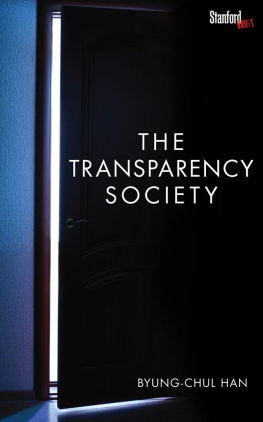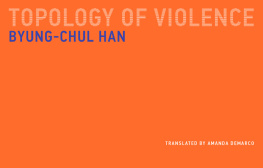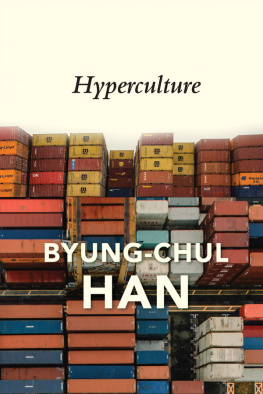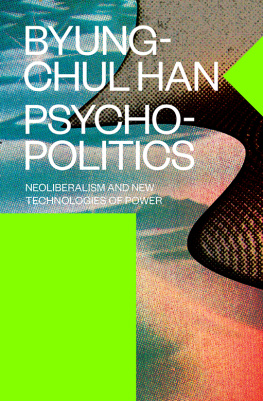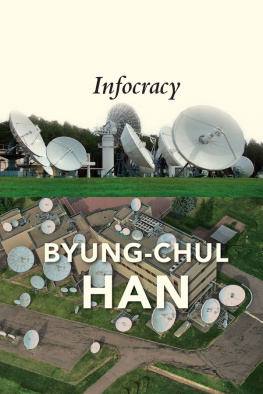Byung-Chul Han - The Transparency Society
Here you can read online Byung-Chul Han - The Transparency Society full text of the book (entire story) in english for free. Download pdf and epub, get meaning, cover and reviews about this ebook. year: 2015, publisher: Stanford University Press, genre: Religion. Description of the work, (preface) as well as reviews are available. Best literature library LitArk.com created for fans of good reading and offers a wide selection of genres:
Romance novel
Science fiction
Adventure
Detective
Science
History
Home and family
Prose
Art
Politics
Computer
Non-fiction
Religion
Business
Children
Humor
Choose a favorite category and find really read worthwhile books. Enjoy immersion in the world of imagination, feel the emotions of the characters or learn something new for yourself, make an fascinating discovery.
- Book:The Transparency Society
- Author:
- Publisher:Stanford University Press
- Genre:
- Year:2015
- Rating:3 / 5
- Favourites:Add to favourites
- Your mark:
- 60
- 1
- 2
- 3
- 4
- 5
The Transparency Society: summary, description and annotation
We offer to read an annotation, description, summary or preface (depends on what the author of the book "The Transparency Society" wrote himself). If you haven't found the necessary information about the book — write in the comments, we will try to find it.
The Transparency Society — read online for free the complete book (whole text) full work
Below is the text of the book, divided by pages. System saving the place of the last page read, allows you to conveniently read the book "The Transparency Society" online for free, without having to search again every time where you left off. Put a bookmark, and you can go to the page where you finished reading at any time.
Font size:
Interval:
Bookmark:
Stanford University Press
Stanford, California
English translation 2015 by the Board of Trustees of the Leland Stanford Junior University.
All rights reserved.
The Transparency Society was originally published in Germany:
Byung-Chul Han: Transparenzgesellschaft. Berlin 2012 MSB Matthes & Seitz Berlin Verlagsgesellschaft mbH, Berlin 2012. All rights reserved by and controlled through Matthes & Seitz Berlin Verlag.
The translation of this work was supported by a grant from the Goethe-Institut which is funded by the German Ministry of Foreign Affairs.

No part of this book may be reproduced or transmitted in any form or by any means, electronic or mechanical, including photocopying and recording, or in any information storage or retrieval system without the prior written permission of Stanford University Press.
Printed in the United States of America
on acid-free, archival-quality paper
Library of Congress Cataloging-in-Publication Data
Han, Byung-Chul, author.
[Transparenzgesellschaft. English]
The transparency society / Byung-Chul Han ; translated by Erik Butler.
pages cm
Translation of: Transparenzgesellschaft.
Includes bibliographical references.
ISBN 978-0-8047-9460-2 (pbk. : alk. paper)
1. Social control. 2. TransparencySocial aspects. 3. Self-disclosureSocial aspects. 4. Freedom of information. 5. InternetSocial aspects. I. Butler, Erik, 1971 translator. II. Title.
HM661.H36 2015
303.3'3dc23
2015020749
ISBN 978-0-8047-9751-1 (electronic)
Typeset by Classic Typography in 10/13 Adobe Garamond
THE TRANSPARENCY SOCIETY
BYUNG-CHUL HAN
Translated by ERIK BUTLER
stanford briefs
An Imprint of Stanford University Press
Stanford, California
CONTENTS
PREFACE
Today the word transparency is haunting all spheres of lifenot just politics but economics, too. More democracy, more freedom of information, and more efficiency are expected of transparency. Transparency creates trust, the new dogma affirms. What is forgotten thereby is that such insistence on transparency is occurring in a society where the meaning of trust has been massively compromised.
Wherever information is very easy to obtain, as is the case today, the social system switches from trust to control. The society of transparency is not a society of trust, but a society of control.
If everything becomes public right away, politics invariably grows short of breath; it becomes short term and thins out into mere chatter. Total transparency imposes a temporality on political communication that makes slow, long-term planning impossible. A vision directed toward the future proves more and more difficult to obtain. And things that take time to mature receive less and less attention.
As total communication and total networking run their course, it proves harder than ever to be an outsider, to hold a different opinion. Transparent communication is communication that has a smoothing and leveling effect. It leads to synchronization and uniformity. It eliminates Otherness. Compulsive conformity proceeds from transparency. In this way, transparency stabilizes the dominant system.
Transparency is a neoliberal dispositive. It forces everything inward in order to transform it into information. Under todays immaterial relations of production, more information and communication mean more productivity and acceleration. In contrast, secrecy, foreignness, and otherness represent obstacles for communication without borders. They are to be dismantled in the name of transparency.
Transparency makes the human being glassy. Therein lies its violence. Unrestricted freedom and communication switch into total control and surveillance. Social media are also coming to resemble, more and more, digital panoptica that discipline and exploit the social.
In disciplinary society, the occupants of the panopticon were isolated from each other for more thorough surveillance, and they were not permitted to speak. The inhabitants of the digital panopticon, on the other hand, engage in lively communication and bare themselves of their own free will. In this way, they actively collaborate in the digital panopticon.
The digital society of control makes intensive use of freedom. It is only possible thanks to voluntary self-illumination and self-exposure. It exploits freedom. The society of control achieves perfection when its inhabitants do not communicate because of external constraint but out of inner needthat is, when the fear of giving up a private and intimate sphere yields to the need to put oneself on display shamelessly.
Transparency is an ideology. Like all ideologies, it has a positive core that has been mystified and made absolute. The danger of transparency lies in such ideologization. If totalized, it yields terror.
I LIVE FROM WHAT OTHERS
DONT KNOW ABOUT ME.
PETER HANDKE
THE SOCIETY OF POSITIVITY
No buzzword dominates contemporary public discourse so much as transparency. Above all, it is emphatically invoked in connection with the freedom of information. The omnipresent demand for transparency, which has reached the point of fetishism and totalization, goes back to a paradigm shift that cannot be restricted to the realm of politics and economics. Today the society of negativity is yielding to a society that progressively dismantles negativity in favor of positivity. Accordingly, the society of transparency manifests itself first and foremost as a society of positivity.
Matters prove transparent when they shed all negativity, when they are smoothed out and leveled, when they do not resist being integrated into smooth streams of capital, communication, and information. Actions prove transparent when they are made operationalsubordinate to a calculable, steerable, and controllable process. Time becomes transparent when it glides into a sequence of readily available present moments. This is also how the future undergoes positivization, yielding an optimal presence. Transparent time knows neither fate nor event. Images are transparent whenfreed from all dramaturgy, choreography, and scenography, from any hermeneutic depth, and indeed from any meaning at allthey become pornographic. Pornography is unmediated contact between the image and the eye. Things prove transparent when they abandon their singularity and find expression through their price alone. Money, which makes it possible to equate anything with anything else, abolishes all incommensurability, any and all singularity. The society of transparency is an inferno of the same.
Whoever connects transparency only with corruption and the freedom of information has failed to recognize its scope. Transparency is a systemic compulsion gripping all social processes and subjecting them to a deep-reaching change. Todays social system submits all its processes to the demand for transparency in order to operationalize and accelerate them. Pressure for acceleration represents the corollary of dismantling negativity. Communication reaches its maximum velocity where like responds to like, when a chain reaction of likeness occurs. The negativity of alterity and foreignnessin other words, the resistance of the Otherdisturbs and delays the smooth communication of the Same. Transparency stabilizes and speeds the system by eliminating the Other and the Alien. This systemic compulsion makes the society of transparency a calibrated society. Herein lies its totalitarian trait: New word for Gleichschaltung: Transparency.
Transparent language is a formal, indeed, a purely machinic, operational language that harbors no ambivalence. Wilhelm von Humboldt already pointed to the fundamental intransparency that inhabits human language:
Next pageFont size:
Interval:
Bookmark:
Similar books «The Transparency Society»
Look at similar books to The Transparency Society. We have selected literature similar in name and meaning in the hope of providing readers with more options to find new, interesting, not yet read works.
Discussion, reviews of the book The Transparency Society and just readers' own opinions. Leave your comments, write what you think about the work, its meaning or the main characters. Specify what exactly you liked and what you didn't like, and why you think so.

